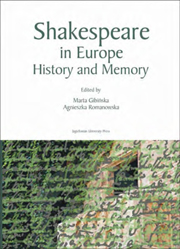Book contents
- Frontmatter
- Contents
- Preface
- Towards a European History of Henry V
- History and Histories
- History and Memory: Criticism and Reception
- History, Memory, and Ideological Appropriation
- Claiming Shakespeare as “Our Own”
- “Must i Remember?:” Hamlet, Memory and Shakespearean Trauma
- Interdisciplinary Shakespeare in the Socialist Republic of Romania. A Comment on Official Censorship and Subversive Practices
- Mingling and Separating in Coriolanus
- “A Goodly House:” Memory and Hosting in Coriolanus
- “Suit the Word to the Action:” Shakespeare's Richard II (2004). A Case of (Meta)Translation?
- “Speak, Memory:” Anniversary Celebrations in the History of the German Shakespeare Society
- Theatre: The Act of Memory and History in the Making
- Index of Authors
“Must i Remember?:” Hamlet, Memory and Shakespearean Trauma
from History, Memory, and Ideological Appropriation
Published online by Cambridge University Press: 05 September 2014
- Frontmatter
- Contents
- Preface
- Towards a European History of Henry V
- History and Histories
- History and Memory: Criticism and Reception
- History, Memory, and Ideological Appropriation
- Claiming Shakespeare as “Our Own”
- “Must i Remember?:” Hamlet, Memory and Shakespearean Trauma
- Interdisciplinary Shakespeare in the Socialist Republic of Romania. A Comment on Official Censorship and Subversive Practices
- Mingling and Separating in Coriolanus
- “A Goodly House:” Memory and Hosting in Coriolanus
- “Suit the Word to the Action:” Shakespeare's Richard II (2004). A Case of (Meta)Translation?
- “Speak, Memory:” Anniversary Celebrations in the History of the German Shakespeare Society
- Theatre: The Act of Memory and History in the Making
- Index of Authors
Summary
Browsing through the piles of glossy and all too hastily made books that in any one of the predictably monotonous Zagreb bookshops pass for literature, sooner or later you are bound to come across a recent novel whose title – if you have Shakespearean interests, proudly admitted or guiltily suppressed – will not leave you indifferent. William Shakespeare u Dar es Salaamu (William Shakespeare in Dar es Salaam) will probably – and rightly – puzzle you, if by nothing else then certainly by the incongruity and complete unlikelihood of its Croatian origin. The author, you may read in the afterword written by Julijana Matanović who is a Slavonian living in Zagreb (which probably means little to those unaware of the complicated web of Croatian regional identities), blurs the neat distinctions between “Bosnian” and “Croatian” literary traditions. Born in Banjaluka, Bosnia, educated in Zagreb, displaced during the 1990s war, Irfan Horozović eventually returned from Berlin as a refugee and went through Zagreb once again only to find his present home in Sarajevo, the Bosnian capital. The point which the critics are often too timid explicitly to mention or too scrupulous not to mention but which is more likely than not to escape the notice of at least some foreigners is that Horozović's name frankly proclaims its Muslim provenance. Although that makes some of the cherished distinctions harder, it helps to explain why encounters between different cultures are more profoundly felt by him than by some of his fellow writers and why they so persistently and so obsessively inform his narratives.
- Type
- Chapter
- Information
- Shakespeare in EuropeHistory and Memory, pp. 187 - 204Publisher: Jagiellonian University PressPrint publication year: 2008

